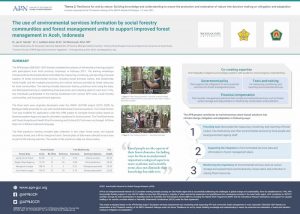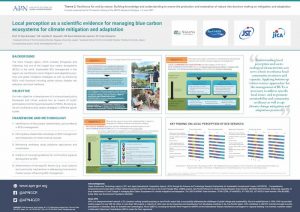1-2 June 2021, Bonn—Two APN-funded projects were featured at the 13th Meeting of the Research Dialogue of UNFCCC SBSTA at a poster session under the theme “Building knowledge and understanding to weave the protection and restoration of nature into decision making on mitigation and adaptation”, highlighting how the co-creation of knowledge and local actions contribute to the development and implementation of policies and actions on mitigation and adaptation.
Enhancing local capacity in sustainable forest management
Mr Jay Samek from the Department of Forestry, Michigan University, introduced a recent training programme in collaboration with collaborators from the University of Syiah Kuala and STIPER Agricultural Institute Yogyakarta, Indonesia, for forest management unit staff and social forestry community members in Aceh province, Indonesia.
The training enhances local capacity in sustainable forest management by measuring and reporting forest carbon, tree biodiversity, provisioning and cultural resources, and forest integrity and health, which support the inclusion of environmental services in forest management units and social forestry village management plans.

Participatory monitoring and evaluation of blue carbon ecosystems
Prof. Ryo Kohsaka from the Graduate School of Environmental Studies, Nagoya University, Japan, shared his recent work on the development of a science-based policy framework and citizen science tool for participatory monitoring and evaluation of blue carbon ecosystems in Indonesia and the Philippines.
The poster provides the results of a baseline study on local perception on blue carbon ecosystems, which provides the basis for a recent APN-funded project in collaboration with researchers from the Graduate School of Environmental Studies, Tohoku University, Japan, that aims to increase understanding of local community awareness and capacity while facilitating bottom-up citizen science approaches for managing blue carbon ecosystems.
